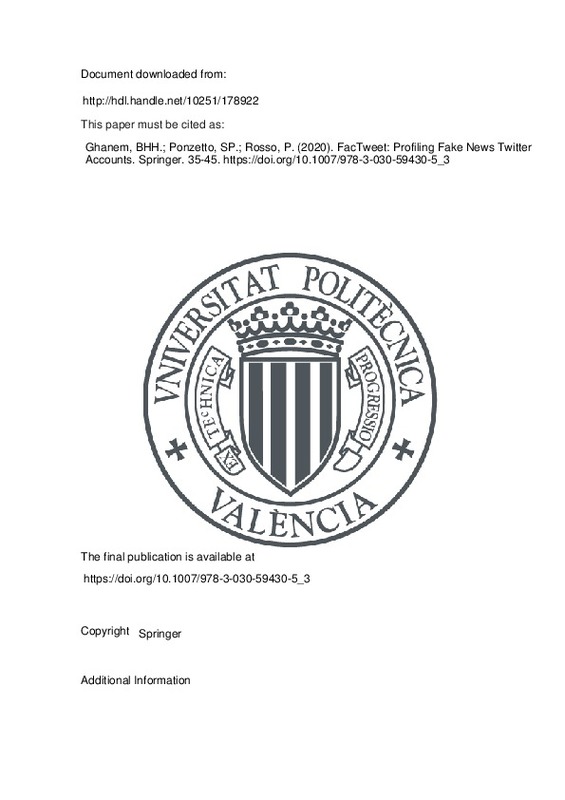Aker, A., Kevin, V., Bontcheva, K.: Credibility and transparency of news sources: data collection and feature analysis. arXiv (2019)
Aker, A., Kevin, V., Bontcheva, K.: Predicting news source credibility. arXiv (2019)
Badawy, A., Lerman, K., Ferrara, E.: Who falls for online political manipulation? In: Companion Proceedings of the 2019 World Wide Web Conference, pp. 162–168. ACM (2019)
[+]
Aker, A., Kevin, V., Bontcheva, K.: Credibility and transparency of news sources: data collection and feature analysis. arXiv (2019)
Aker, A., Kevin, V., Bontcheva, K.: Predicting news source credibility. arXiv (2019)
Badawy, A., Lerman, K., Ferrara, E.: Who falls for online political manipulation? In: Companion Proceedings of the 2019 World Wide Web Conference, pp. 162–168. ACM (2019)
Baly, R., Karadzhov, G., Alexandrov, D., Glass, J., Nakov, P.: Predicting factuality of reporting and bias of news media sources. In: Proceedings of the 2018 Conference on Empirical Methods in Natural Language Processing (EMNLP), pp. 3528–3539 (2018)
Baly, R., Karadzhov, G., Saleh, A., Glass, J., Nakov, P.: Multi-task ordinal regression for jointly predicting the trustworthiness and the leading political ideology of news media. In: Proceedings of the 2019 Conference of the North American Chapter of the Association for Computational Linguistics: Human Language Technologies, Volume 1 (Long and Short Papers), pp. 2109–2116 (2019)
Boyd, R.L., et al.: Characterizing the Internet Research Agency’s Social Media Operations During the 2016 US Presidential Election using Linguistic Analyses. PsyArXiv (2018)
Choi, Y., Wiebe, J.: +/-EffectWordNet: sense-level lexicon acquisition for opinion inference. In: Proceedings of the 2014 Conference on Empirical Methods in Natural Language Processing (EMNLP), pp. 1181–1191 (2014)
Clark, E.M., Williams, J.R., Jones, C.A., Galbraith, R.A., Danforth, C.M., Dodds, P.S.: Sifting robotic from organic text: a natural language approach for detecting automation on Twitter. J. Comput. Sci. 16, 1–7 (2016)
Davis, C.A., Varol, O., Ferrara, E., Flammini, A., Menczer, F.: BotOrNot: a system to evaluate social bots. In: Proceedings of the 25th International Conference Companion on World Wide Web, pp. 273–274. International World Wide Web Conferences Steering Committee (2016)
Dhingra, B., Zhou, Z., Fitzpatrick, D., Muehl, M., Cohen, W.W.: Tweet2Vec: character-based distributed representations for social media. In: The 54th Annual Meeting of the Association for Computational Linguistics (ACL), p. 269 (2016)
Dickerson, J.P., Kagan, V., Subrahmanian, V.: Using sentiment to detect bots on Twitter: are humans more opinionated than bots? In: 2014 IEEE/ACM International Conference on Advances in Social Networks Analysis and Mining (ASONAM 2014), pp. 620–627. IEEE (2014)
Ghanem, B., Buscaldi, D., Rosso, P.: TexTrolls: identifying Russian trolls on Twitter from a textual perspective. arXiv preprint arXiv:1910.01340 (2019)
Ghanem, B., Cignarella, A.T., Bosco, C., Rosso, P., Rangel, F.: UPV-28-UNITO at SemEval-2019 Task 7: exploiting post’s nesting and syntax information for rumor stance classification. In: Proceedings of the 13th International Workshop on Semantic Evaluation (SemEval), pp. 1125–1131 (2019)
Ghanem, B., Glavas, G., Giachanou, A., Ponzetto, S.P., Rosso, P., Pardo, F.M.R.: UPV-UMA at CheckThat! Lab: verifying Arabic claims using a cross lingual approach. In: Working Notes of CLEF 2019 - Conference and Labs of the Evaluation Forum, Lugano, Switzerland, 9–12 September 2019 (2019)
Ghanem, B., Rosso, P., Rangel, F.: An emotional analysis of false information in social media and news articles. ACM Trans. Internet Technol. (TOIT) 20(2), 1–18 (2020)
Giachanou, A., Rosso, P., Crestani, F.: Leveraging emotional signals for credibility detection. In: Proceedings of the 42nd International ACM SIGIR Conference on Research and Development in Information Retrieval, pp. 877–880 (2019)
Graham, J., Haidt, J., Nosek, B.A.: Liberals and conservatives rely on different sets of moral foundations. J. Pers. Soc. Psychol. 96(5), 1029 (2009)
Im, J., et al.: Still out there: modeling and identifying Russian troll accounts on Twitter. arXiv preprint arXiv:1901.11162 (2019)
Karduni, A., et al.: Can you verifi this? Studying uncertainty and decision-making about misinformation using visual analytics. In: Twelfth International AAAI Conference on Web and Social Media (ICWSM) (2018)
Mohammad, S.M., Turney, P.D.: Emotions evoked by common words and phrases: using mechanical turk to create an emotion lexicon. In: Proceedings of the NAACL HLT 2010 Workshop on Computational Approaches to Analysis and Generation of Emotion in Text, pp. 26–34 (2010)
Shao, C., Ciampaglia, G.L., Varol, O., Flammini, A., Menczer, F.: The spread of fake news by social bots. arXiv preprint arXiv:1707.07592, pp. 96–104 (2017)
Volkova, S., Shaffer, K., Jang, J.Y., Hodas, N.: Separating facts from fiction: linguistic models to classify suspicious and trusted news posts on Twitter. In: Proceedings of the 55th Annual Meeting of the Association for Computational Linguistics (ACL) (Volume 2: Short Papers), vol. 2, pp. 647–653 (2017)
Vosoughi, S., Roy, D., Aral, S.: The spread of true and false news online. Science 359(6380), 1146–1151 (2018)
Wilson, T., Wiebe, J., Hoffmann, P.: Recognizing contextual polarity in phrase-level sentiment analysis. In: Proceedings of Human Language Technology Conference and Conference on Empirical Methods in Natural Language Processing (EMNLP) (2005)
[-]







![[Cerrado]](/themes/UPV/images/candado.png)


